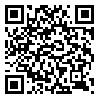Volume 9, Issue 43 (12-2021)
erj 2021, __(43): 206-218 |
Back to browse issues page
Research code: A-10-4015-1
Download citation:
BibTeX | RIS | EndNote | Medlars | ProCite | Reference Manager | RefWorks
Send citation to:



BibTeX | RIS | EndNote | Medlars | ProCite | Reference Manager | RefWorks
Send citation to:
provide a model for empowering teachers in the field of virtual education during the Corona era. erj 2021; 9 (43) : 9
URL: http://erj.khu.ac.ir/article-1-1054-en.html
URL: http://erj.khu.ac.ir/article-1-1054-en.html
Abstract: (10827 Views)
The purpose of this study was to provide a model for empowering teachers in the field of virtual education during the Corona era Friday included 400 primary school teachers in Khorramabad city in the academic year of 1399-1400. The data collection tool was semi-structured and questionnaire The targeted sampling method was used to select the first and March of snowball to choose other people Based on theoretical saturation with 26 of the teachers interviewed Then, according to the Morgan table, 196 people were determined as an example and a relative stratified sampling method was used to collect data From the field theory and paradigm model for analyzing qualitative data and using Pls 2 software, structural equations were used for quantitative analysis of data The results showed that empowerment in the field of virtual education is subject to three categories of organizational factors of information and communication technology incentive and regulatory policies, Factors related to teacher(Digital literacy of educational, content is the ability to teach, psychological characteristics) And the student's agents(The psychological characteristics , digital literacy and social status). The results indicated the optimal fit to the model. The analysis of structural equations showed that the organizational factors in the teacher and students' factors have the greatest impact on the empowerment of teachers in the field of virtual education, respectively.
Article number: 9
Type of Study: Research Paper |
Subject:
Educational Management
Received: 2021/09/17 | Revised: 2023/11/21 | Accepted: 2022/04/12 | ePublished: 2022/05/1
Received: 2021/09/17 | Revised: 2023/11/21 | Accepted: 2022/04/12 | ePublished: 2022/05/1
References
1. Ayebi-Arthur, K. (2017). E-learning, resilience, and change in higher education: Helping a university cope after a natural disaster. E-Learning and Digital Media, 14(5), 259-274. [DOI:10.1177/2042753017751712]
2. Balkar, B. (2015). Defining an empowering school culture (ESC): Teacher perceptions. Issues in Educational Research, 25(3): 205-225.
3. Ball, A. F. and Tyson, C. A., 2011. 'Preparing Teachers for Diversity in the Twenty-first Century', in Ball, A. F. and Tyson, C. A. (eds.) Studying Diversity in Teacher Education. Lanham, Maryland: Rowman and Littlefield
4. Bansal, S. (2020). Impact of the COVID-19 Pandemic on Education, Rise of Online Teaching-Learning Process & Effects on Health of Kids. Rise of Online Teaching-Learning Process & Effects on Health of Kids (May 8, 2020). [DOI:10.2139/ssrn.3595971]
5. Dhawn, sh., (2020). Online Learning: A Panacea in the Time of COVID-19 Crisis, Vol. 49(1) 5-22 [DOI:10.1177/0047239520934018]
6. Fiona King (2019). Professional learning: empowering teachers, Professional [DOI:10.1080/19415257.2019.1580849]
7. Huang, R. H., Liu, D. J., Tlili, A., Yang, J. F., Wang, H. H., Zhang, M., Lu, H., Gao, B., Cai, Z., Liu, M., Cheng, W., Cheng, Q., Yin, X., Zhuang, R., Berrada, K., Burgos, D., Chan, C., Chen, N. S., Cui, W., Hu, X. et al. (2020). Handbook on facilitating flexible learning during educational disruption: The Chinese experience in maintaining undisrupted learning in COVID-19 outbreak. Smart Learning
8. Institute of Beijing Normal University. Indonesian's, education2, (1): 2017, 37-48
9. Liguori, E. W., & Winkler, C. (2020). From offline to online: Challenges and opportunities for entrepreneurship education following the COVID-19 pandemic. [DOI:10.1177/2515127420916738]
10. Jones A. (2010). Affective Issues in Learning Technologies Emotional Responses to Technology andTechnology, s Role in Supporting Socio-Emotional Skills. JiME [Internet]. Cited 2010 Sep; JIME Special Issue on Researching Computers and Learning: 1-22. available:http://jime.open.ac.uk/2010/09 [DOI:10.5334/2010-9]
11. Martin, A. (2020). How to optimize online learning in the age of coronavirus (COVID-19): A 5-point guide for educators.
12. McBrien, J. L., Cheng, R., & Jones, P. (2009). Virtual spaces: Employing a synchronous online classroom to facilitate student engagement in online learning. The International Review of Research in Open and Distributed Learning, 10(3), 117 [DOI:10.19173/irrodl.v10i3.605]
13. McGorry, S. Y. (2002). Online, but on target? Internet-based MBA courses: A case study. T he Inte r net a nd Highe r Educ a tion, (2): 167-175 [DOI:10.1016/S1096-7516(02)00089-1]
14. Ranjbar H, Haghdoost A, Salsali M, Khoshdel A, Solaymani M, Bahrami N, Sampling in qualitative research, Tips to start Journal of Army University of Medical Sciences of the Islamic Republic of Iran,2012(10)(3)250-238
15. Rieley, J. B. (2020). Corona Virus and its impact on higher education. Research Gate
16. Shahzad, S, Hussain, G, Sadaf, N, Sarwat, S, Ghani, U; & Saleem, R, (2020). Impact of Virtual Teaching on ESL Learners' Attitudes under Covid-19 Circumstances at Post Graduate Level in Pakistan. Vol. 13, No. 9. [DOI:10.5539/elt.v13n9p1]
17. Thomas, S. (2017). Teacher Empowerment: A Focused Ethnographic Study in Brunei Darussalam. The Qualitative Report, 22(1), 47-72. [DOI:10.46743/2160-3715/2017.2587]
18. Tindowen, D. J. (2019). Influence of empowerment on teachers' organizational behaviors. European Journal of Educational Research, 8(2), 617-631. [DOI:10.12973/eu-jer.8.2.617]
19. Tull, S. P. C., Dabner, N., & Ayebi-Arthur, K. (2017). Social media and e-learning in response to seismic events: Resilient practices. Journal of Open, Flexible and Distance Learning, 21(1), 63-76.
20. Yulia, H. Devi, P. (2017). Empowering teachers to increase a quality of Zimmerman M A. 1990. Taking aim on empowerment research: On the distinction
| Rights and permissions | |
 |
This work is licensed under a Creative Commons Attribution-NonCommercial 4.0 International License. |



